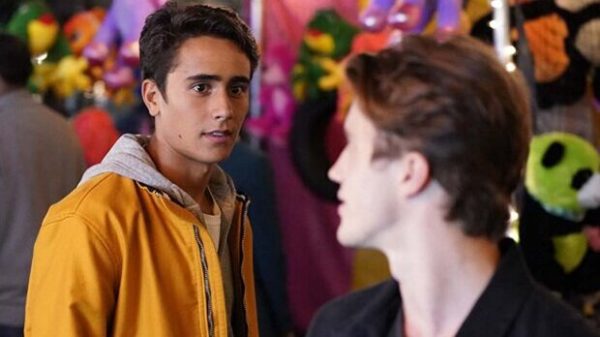
Hulu’s spiritual sequel to Love, Simon offers plenty of swoon-worthy (barely) PG romance for straight and queer viewers, though too many characters and short run times crowd the narrative and pull focus from the central love triangle.
This review addresses the first half (5 episodes) of the season.
- Episodes 6-10 (on Gayly Dreadful)
- S02 Episodes 1-5
- S02 Episodes 6-10 (On Gayly Dreadful)
JOE
Terry, it feels like an understatement to say that we’ve been excited for the arrival of Love, Victor since it was announced last year. A queer-centered series set in the same universe as the Becky Albertalli books (Simon vs The Homosapien Agenda & Leah on the Offbeat) and an extension of Love, Simon, the the mega successful teen romance/fantasy adaptation directed by gay super producer Greg Berlanti..
I did a deep dive comparison of Simon vs. the Homo Sapien and Love, Simon for my YA podcast Hazel & Katniss & Harry & Starr and me and my co-host Brenna identified a few slightly problematic areas in that original combo, including Simon (Nick Robinson)’s amazing parents, his upper/middle class status and his whiteness.
It’s interesting, then, to consider Love, Victor. The new series, which was created for Disney+ (and then moved to Hulu out of concerns that it was too “mature” for the Mouse House streamer – more on that later) is essentially from the same creative team: Berlanti is out, but the show is being run by Love, Simon’s writers, Isaac Aptaker and Elizabeth Berger. I say “interesting” because the TV extension of the Creekwood High School story seems to be deliberately interrogating the concerns that folks had with the film.
Instead of Simon’s white, supported, affluent lead, Love, Victor is the story of Victor (Michael Cimino), the oldest of three siblings whose family has recently moved to Atlanta from Texas. His slightly younger sister Pilar (Isabella Ferreira) is vocally upset by the move, while little brother Adrian (Mateo Fernandez) is much more easy going. Victor’s parents Armando (James Martinez) and Isabel (Ana Cortiz) are struggling financially with the move and they bicker fairly frequently, which we learn over the first five episodes is due to some marital instability.

Victor’s family is explicitly not rich: their new apartment is clearly big, but it is in a “poor” section of town. Victor is a gifted basketball player, but when he’s invited to join the Creekwood team, he doesn’t have the $500 fees to cover the uniform and other costs. These aren’t significant plot points (the family seems happy enough in the new space and the basketball fees are waved away when Victor gets a job at a local coffee shop), but “different income bracket” is a persistent underlying element in the series, particularly in contrast to romantic interest Mia (Rachel Hilson)’s palatial digs.
Of course the main premise concerns Victor’s desire to reinvent himself in a new school and maybe figure out just who he is sexually. Love, Victor begins in media res as Victor angrily Instagram DMs Simon from the film to chastise him for having a fantasy perfect life. Then the series flashes back a few days to reveal that things aren’t quite as simple for Victor. In addition to the financial woes, his family is fairly religious (an early scene features Isabel hanging a cross prominently in the kitchen) and, naturally, Victor is struggling with his sexuality. Throughout his first day at Creekwood High, Victor is repeatedly confronted by homophobic micro aggressions or presumptions about his sexual orientation in the form of invasive questions.
Terry, one of my favourite elements of these early episodes is the series’ refusal to explicitly label Victor as gay, bi or pan. Love, Victor is telling a far more complicated sexual story and it feels extremely refreshing and relevant for contemporary audiences.
How do you feel about Victor’s central love triangle between coffee shop co-worker Benji (George Sear) and Mia? What is your impression of the other students, like awkward neighbour Felix (Anthony Turpel), jock Andrew (Mason Gooding) and Mia’s bestie, Lake (Bebe Wood)? And are you at all invested in the lives of the parents, which expands to include Mia’s daddy drama in episode four?
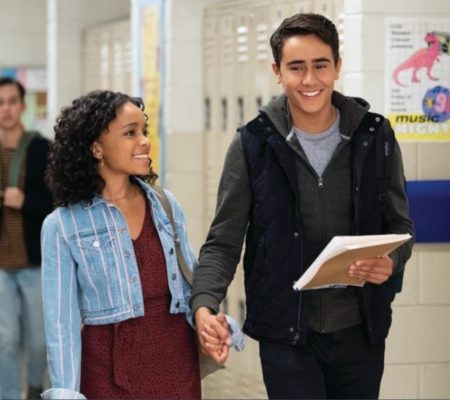
TERRY
When Victor DMs Simon and caps off the first episode with a “because my story is nothing like yours,” I literally cheered in my room, Joe. I am an absolute fan of Love, Simon because it felt like the teen romances that I grew up on, only the story was about a gay kid. As much as the movie was a very specific and almost fantasy-like portrayal of finding acceptance in a world filled with homophobia, all I could think about was how much this would have meant to me as a deeply closeted teenager. And seeing YouTube videos, confessionals and messages around the internet about how the movie gave kids an avenue to come out to their parents was so incredibly life-affirming.
Yet, as you pointed out, it was incredibly white, incredibly benign and very upper class (I mean, I’d kill for Simon’s room as an adult…just sayin’).
So, I’m glad that Love, Victor shows that Simon’s profession of love and very chaste kiss with Bram (Keiynan Lonsdale) didn’t magically solve homophobia. Instead, it presents a more realistic version of the world where straight people–like returning queen Ms. Albright (Natasha Rothwell)–might perceive things are better but queer students in the thick of it know differently. This is nowhere more evident than jock Andrew, whose introduction is shirtless in the locker room, asking Victor if he “likes what he sees,” referring to the cluster of similar shirtless jocks who are making gay jokes.
At first Andrew feels like a natural villain for Victor. After one strong showing in PE, Victor is immediately asked to join the Varsity team (which, by the way, is not how sports works? Don’t you have to like…audition…or whatever sportspeople call it?) But in the first half of the season, the show doesn’t quite know what to do with Andrew and his role is relegated to moping after Mia. Meanwhile, Creeksecrets resident poster, Lake pines after Andrew and Simon’s bestie, Felix pines after Lake.
There’s a lot of pining going on, Joe.
The problem is, in this first half at least, we don’t really get a good feel for the plentiful side characters, so they’re mostly reduced to one characteristic combined with pining:
Andrew: Jerk + Pining
Lake: Sarcastic + Pining
Felix: Socially Anxious + Pining
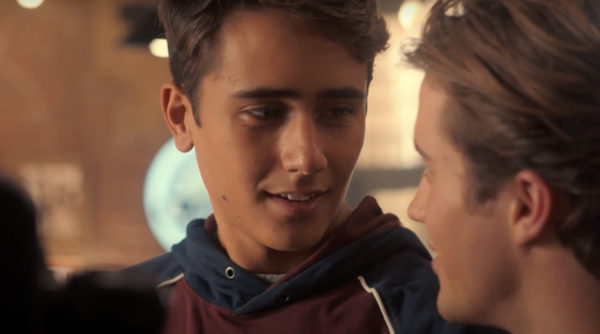
With each episode clocking in at just under 30 minutes, there’s too many characters who aren’t given enough motivation or characterization to make them interesting. And we haven’t even really discussed the parents!
As you mentioned, Victor’s parents Armando and Isabel moved their family from Texas to Atlanta. Over the first five episodes we slowly learn that the move is because Isabel cheated on Armando (though it seems there’s a bit more to this story…). By the time we get to episode 4 and are introduced to Mia’s dad (a surprising and appreciated appearance by Mekhi Phifer) and learn about his problems (to say nothing of the reveal that Lake’s mother is a famous local broadcaster)…it’s too much.
That’s a long-winded way of answering your question, Joe: I don’t care a whit about the parents’ problems. I’m much more interested in seeing Victor explore his identity and sexuality, revisiting locations and themes from Love, Simon (particularly how this new series subverts them) and getting to know our main teen characters. If the episodes were drama length, I probably wouldn’t mind as much. But the 28 minutes fly by and even after five episodes, I still feel like I’m being held at arm’s length from these characters.
I am living for Victor’s relationship and friendship with both Mia and Benji. Mia is a more fully realized character than I expected and she shares a charming chemistry with Victor that feels authentic. But Victor and Benji’s easy, lived-in friendship is so incredibly adorable. Two of my favorite scenes from the first five episodes involve Victor and Benji.
The first is while Victor is applying for a job at the coffee shop. Benji shows him how to pack in espresso (“pack it in real tight…see how tight that is”) while biting his lip and locking eyes with Victor…right before Victor’s milk froths over. I mean, it’s a perfect, hilarious metaphor for that anxious feeling you get standing close to someone you’re attracted to. My other favorite scene is Victor and Benji just shaking their asses to “Call Me Maybe.” It’s adorable.
I could fawn over the casting choices for Victor, Benji and Mia all day, but I’m curious Joe how you feel about the way each episode includes “Mentor Simon” in a voice over? How do we feel about the vaguely patronizing way a rich, white dude is providing advice to Victor? Do you think Love, Victor’s move from Disney+ to Hulu is a good or bad thing? And, most importantly, just how freakin’ charming and adorable is Michael Cimino?
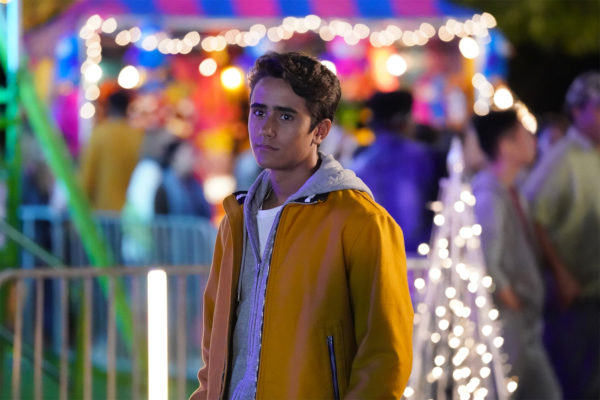
JOE
Cimino is incredibly charming and adorable (that smile! I die) – he’s an incredible find for the series because he imbues Victor with so much warmth and heart. Both the film and the series have lucked out with the casting of their leads because it goes a long way to getting your audience to invest in an “unconventional” romantic journey.
I’m glad you raised the fact that the series is overstuffed in this front half. I want to give Aptaker and Berger credit for being ambitious with their swath of characters and storylines, but it’s undeniable that with each episode’s short run time, we never quite get enough time with anyone. Perhaps it’s because we’re starved for queer YA content, Terry, but I’m *hugely* invested in Victor’s love triangle between Mia and Benji, so when the series expands to show a frankly terrible date between Andrew and Lake in episode three, orIsabel and Armando’s attempt at date night, I get antsy.
It’s tough because – especially with the latter pairing – the actors are great and the commitment to showing the complicated interior life of adults is commendable, but even in the 2.5 hrs we’ve watched by this halfway point, I feel like I barely know who half of these characters are. I can’t help but think slowly rolling in the parents’ drama and prioritizing the kids in the front half would have been a better call. As it stands all I know about the other teens is the brief shorthand you outlined above, and that doesn’t make me care about Lake, Andrew or Felix.
And then there’s the inclusion of Simon Spier. Like Never Have I Ever, the Mindy Kaling Netflix series which uses tennis pro John McEnroe, the use of a well-known voice-over narrator works reasonably well for ~one episode. Here it’s a natural connective element to reassure viewers that we’re in the same universe as the film, but not only does Simon’s continued willingness to respond to a teen he’s never met not make sense, it becomes increasingly unnecessary with each passing episode. With so many characters fighting for screen time, wouldn’t it make more sense to provide Simon with a confidant – perhaps love-interest Benji – and make the series less reliant on Simon?
As for the network change…oof do I think Disney+ made the wrong call here. There’s literally nothing in this *barely* PG rated series to merit a move from the more family-friendly network to the more teen/adult-oriented Hulu. Hulu debuted a TV adaptation of John Green’s novel Looking For Alaska last year and that series tackled suicidal ideation, drug abuse and grief in ways that are far more hard-hitting than the chaste depiction of teen lives on display in Love, Victor. And yet…they’re equivalents in terms of Hulu branding?
To be frank: this feels like Disney feared that the inclusion of queer content on their “family” streaming site would upset Conservative asshats, prompting them to make a pre-emptive, ill-advised decision. It’s especially disappointing considering it’s <checks calendar> both 2020 and freaking Pride Month!
Terry, what are your thoughts on Simon and the Disney+ vs Hulu drama? How do you feel about the representation of queer elements on the show? And what are you hoping to see in the back half of this first season?
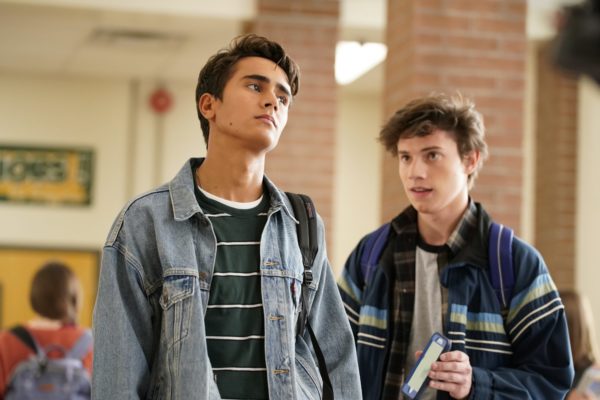
TERRY
I’m with you, Joe. I think the decision to start the show under Disney+’s very conservative “family friendly” moniker before transitioning it to Hulu only hurts the series. The entire concept of it feels very Disney Channel-esqe, from the way the opening credits are staged to the very vanilla and chaste romantic elements between both the M/F and M/M relationships.
I wanted to focus on episode 5, “Sweet Sixteen”, in particular, because it presents a culture clash when both Victor’s severely conservative, religious grandparents and an openly gay couple show up at his 16th birthday party. Victor spends most of the episode trying to hide the fact that his two gay friends are, in fact, gay. And when his grandfather finally sees the two boys kissing, he pulls Victor aside and tells him that they can’t “do that” because, “what if your little brother sees them?”
It’s this conversation that really hit home just what Disney did by shoving this to Hulu.
We’re supposed to laud the fact that Victor stands up to his masculine father and conservative grandparents and that this could be a moment that would elicit conversation. When it’s contrasted with Disney’s decision, though, it provides an almost hilariously ironic statement. Didn’t Disney just do what Victor’s grandparents did, when they told two gay kids they shouldn’t share a chaste kiss (and let’s be honest, this was the most vanilla of kisses) in public? But unlike Benji and his boyfriend, Love, Victor didn’t have a Victor to stand up to Disney.
On the positive side, I’m pretty pleased with some of the music choices the show went with. Love, Simon was defined as much by its music as it was the story and that trend continues, somewhat, in Love, Victor. The opening theme is sung by Tyler Glenn (of Neon Trees fame), an out gay Morman man who penned the album Excommunicated about his fight with the Mormon church’s stance on homosexuality. His song “John, Give ‘Em Hell” from that album about John Dehlin still puts a knot in my throat and brings tears to my eyes. So to have a song by him as Love, Victor’s theme is triumphant.
The first five episodes also promote songs by other queer alt-pop artists like Wrabel and The Japanese House, while mixing in some straight bands. When the show returns (hopefully) for season two, I really hope the showrunners focus more on queer artists. As much as I love Jack Antonoff and his contributions to Love, Simon, there’s a world of queer alt-pop and alt-rock artists out there that are often overlooked by straight artists and bands and allies like Bleachers. And how amazing and quietly revolutionary would it be to have an album filled with queer alt-pop voices?
Hopefully we’ll see more of that in the back half, too, Joe. More examinations of teens grappling with their sexuality, some kind of resolution (other than to connect it to the movie) to why we have Simon’s mentorship. More characterizations of the teens and a focus on giving our main cast more dimension.
And, of course, more queer content. Always more queer content.
All 10 episodes of Love, Victor drop June 19 on Hulu. Look for our spoiler-filled review of the entire season on Episodes 6-10 then.